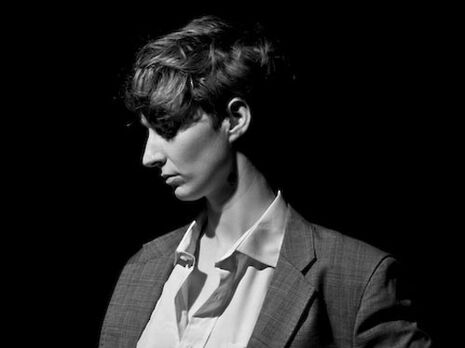Reinventing nostalgia: LoneLady
LoneLady talks to Rory Williamson about the cultural moment and her creative process

Julie Campbell is a lazy journalist’s dream: a Mancunian musician whose sound echoes many of the hallmarks of that city’s post-punk scene, she invites categorisation as a revivalist lurking on the fringes of modern music. Such comparisons, says Campbell, are merely writers failing to “look beyond what’s right under their nose”; they miss the considerable subtlety to be found in her music, the precise angularity of which strikes like a shard of glass.
Take her pseudonym, for example: it’s easy to think of her choice of LoneLady as indicative of singular isolation, but it’s a charge the musician for the most part denies: “I don’t think my music is detached at all. The word ‘lone’ implies something questing, venturing; it’s not necessarily about alone-ness. In choosing the creative life you’re making a decision, to some extent, to exist in the realm of the imagination. In the face of the pressing realities of the outside world you have to aggressively protect and feed the inner spark. I often absolutely do feel detached from the world.
“This doesn’t mean I’m not interested in it – far from it. I think you have to derail yourself from the world in order to figure out how you want to re-enter and exist in it.” This is something that last year’s collaboration with Jah Wobble, Psychic Life, allowed Campbell to do: holding on to his “coat-tails” in the process was “like a holiday” for her, while the album provided an avenue through which to explore her interest in psychogeography. This, she elaborates, “roughly means reconsidering the built environment in an imaginative, off-the-map way,” very much in keeping with her effort to reconstruct the world from outside of it.
Here, then, lies the subtlety behind what can be misconstrued as detachment: on her debut, she sought to explore the Manchester comprised of “dilapidated spaces”: “I wanted to turn away from the bright lights and follow the canal paths to the weedy edges. I felt I needed to find a place that echoed how I felt. They resemble the places I played as a child, and have a magical force; they give the imagination space to expand.” It’s this generation of creative energy from such abandoned spaces that is so striking about her method, something that extends to the complete control she takes over all of her solo work: “...even though it’s often hard to generate that energy on your own, I am driven to work that way.”

Considering her interest in her native city comes from such an interesting and personal place, it must be disheartening to be so dogged by comparisons to its music scene from the 70s and 80s. “I don’t mind the referencing of musical lineage particular to my home city; it’s inevitable. I think my identity as a Mancunian is present in the music but in a more interior way, one that’s harder to pinpoint. I also think Nerve Up references early REM more than it does Mancunian bands.”
Spotting reference points for her particular brand of post-punk may be easy, but it’s meaningless: her approach is far from interested in nostalgia for its own sake. While Campbell admits to being drawn to the scene of the 70s and 80s as a “time of energised, awake music making,” the word nostalgia suggests to her “a wallowing in the past as though it were a comfort-blanket. It’s challenging to try and give a voice to your own idiosyncrasies.”
LoneLady’s music is unquestionably successful in giving its unique spin on the sounds it utilises, but Campbell expresses some dismay at the current state of spreading her work: “music is disseminated to audiences now at white-hot speed, and to me resembles a kind of cacophony in which it is harder to discern a single good or real voice when it emerges.” This is part of what fuels her interest in some of the music of the past, at a time when “there was somehow more space in music and in the way it was conveyed to audiences. Anticipation and mystery were possible. Recording music onto a piece of vinyl or CD in the face of this total atomisation seems like an insane act, which perversely encourages me to carry on doing so.”
The past, then, is not a place for wallowing but somewhere to seek rejuvenation in what feels like a stagnant cultural moment. “I like the idea of a time when culture wasn’t so instantaneous and disposable. I don’t think what I’m interested in is about nostalgia; perhaps it’s more a partial rejection of where we’re currently at in culture. So much of it doesn’t seem to me to be improving our lives.” In a world of disposable culture, LoneLady’s explorations of issues past and present provide a progressive voice that, far from being isolated in a haze of nostalgia, is vital.
 News / Caius mourns its tree-mendous loss23 December 2025
News / Caius mourns its tree-mendous loss23 December 2025 News / Cambridge welcomes UK rejoining the Erasmus scheme20 December 2025
News / Cambridge welcomes UK rejoining the Erasmus scheme20 December 2025 News / CUP announces funding scheme for under-represented academics19 December 2025
News / CUP announces funding scheme for under-represented academics19 December 2025 News / King appoints Peterhouse chaplain to Westminster Abbey22 December 2025
News / King appoints Peterhouse chaplain to Westminster Abbey22 December 2025 Interviews / Politics, your own way: Tilly Middlehurst on speaking out21 December 2025
Interviews / Politics, your own way: Tilly Middlehurst on speaking out21 December 2025







